Deciding to quit a job can be emotional and challenging. Figuring out the right time, and the common reasons for leaving a job may be complicated. Before you take the plunge, it's important to weigh all the factors involved in making this life-changing decision.
This article will explore some of the primary motives for why you may want to leave your current job. We'll look at both positive and negative reasons for leaving, as well as potential consequences to consider before making your decision.
In addition, we'll discuss what steps need to be taken once the choice has been made.
Create your professional Resume in 10 minutes for FREE
Build My Resume
Top 15 reasons for leaving a job
Making the decision to depart employment can be tricky. Here are the top 15 causes that may prompt people to departure from their jobs:
1. Inconsistency with career objectives
Sometimes a job just isn't the right fit. You may have taken a job thinking it would help you move toward your career goals, but it didn't. It likely was too far removed from your field, or the job responsibilities weren't what you expected.
Growth is painful. Change is painful. But nothing is as painful as staying stuck somewhere you don’t belong.
Staying motivated and on top of your work can be challenging. After all, why put in the effort if the job isn't going to help you get closer to your goal?
If you leave that kind of occupation for one that is more aligned with your goals, you can focus on something that may help you achieve those aims.
It also means that you'll be able to acquire invaluable experience that could propel you toward success in your career. In addition, a job that is in line with your long-term goals can bring more satisfaction and enjoyment to your day-to-day work.
Jane took a retail occupation hoping to enter marketing but found it didn’t build the right skills. She switched to an assistant role, which aligned better with her goals and helped her grow in her desired field.
Don't be afraid to quit the job if you're currently employed in a place that's not taking you where you want to go.
Taking a step back may allow you to take two steps forward in the long run.

2. Desire to change work arrangement
Changing jobs to explore different working conditions can be a great way to find more balance in your life. Perhaps you need more flexibility to take care of family commitments, or maybe you'd like to switch to remote work.
If the current place is not meeting your needs for flexible working hours or good office location, it might be a reason for a job change.
Mark left his office job to take a remote position, allowing him to care for his children and have a more flexible schedule.
You may have to give up some other benefits. But getting the work-life balance you want might be worth it.
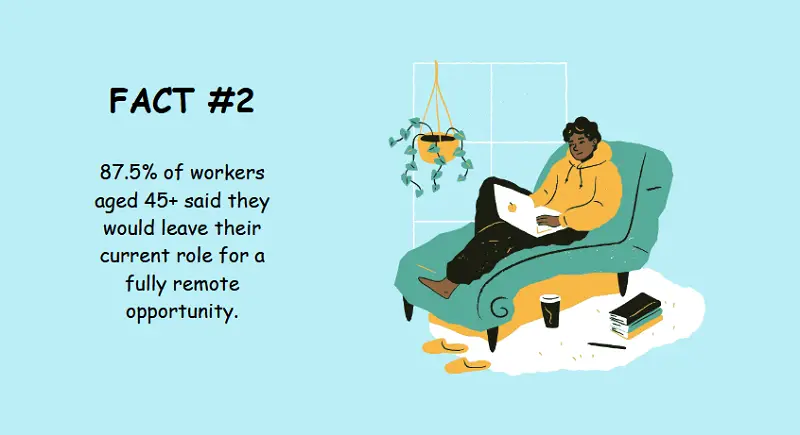
3. Absence of the promotion
Promotions are an important way to advance your career, but when they don't come through, it can be soul-crushing. If you worked hard and still didn't get the promotion, you may consider it as a good reason for leaving a job.
No one likes being overlooked. It's especially difficult when you know that you deserve the new position. When the person who was promoted had less experience, knowledge, or skills needed for the position than you do, it can feel like a slap in the face.
Lisa was passed over for a team lead role despite consistently strong performance. This prompted her to find a job where her efforts would be recognized.
It can be even more frustrating when you never get to hear why you are not promoted. You may even not be aware of the real reason. In that case, it's likely best to look for another job where you'll be appreciated and rewarded for your hard work.
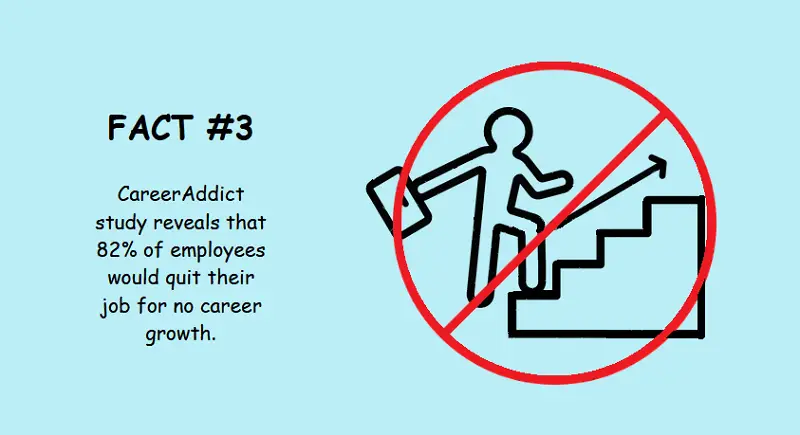
4. Conflicting situations
When you start a job, you don't always know who your boss will be. You can learn about the culture and the values of the company, but you can't predict how well you'll get along with your manager.
If you are in the midst of a crisis wherein you and your supervisor disagree on a regular basis, it can be immensely exhausting. You might feel like your work isn't appreciated, or worse yet, that you're being treated unfairly.
After repeated disagreements with her manager and no resolution from HR, Emma decided to leave for a workplace with a healthier team dynamic.
Remember that feeling uncomfortable with your boss is not a reason to quit a job immediately. Instead, try speaking to HR representatives to see if there are any solutions. If no resolution is found and the situation continues to worsen, then it may be an option to contemplate leaving your job.
Once you've done everything in your power to succeed and exhausted all other bets, you can feel confident in making the decision to leave for better opportunities.
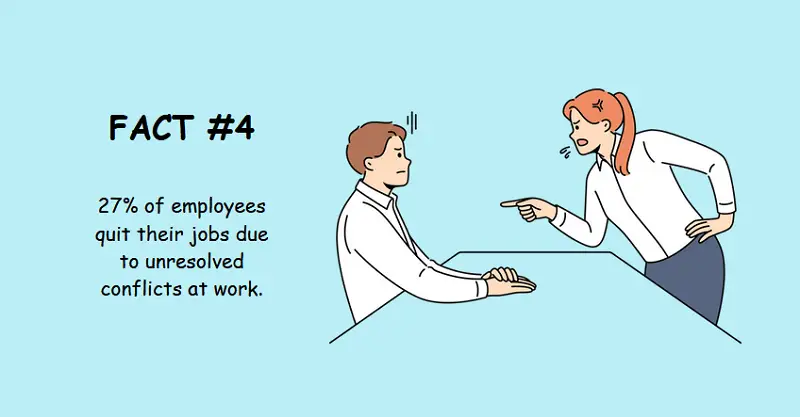
5. Career plateau
A career plateau is a point in a person's career where they feel like they have hit a dead end. They are no longer learning new things, being challenged, or seeing any opportunities for advancement.
Have you ever felt like you were just too good for the job? If so, you may be overqualified and ready to advance.
You can’t start the next chapter of your life if you keep re-reading the last one. | Michael McMillian
It's a tough call to make. On one hand, staying in a job can provide stability and a steady paycheck. On the other, being overqualified can leave you feeling unfulfilled and frustrated.
David felt stuck in his role with no opportunities to grow or learn new skills. So he pursued a new job that challenged and motivated him.
If you find yourself in this situation, consider these points:
- What are your career goals?
- Are you growing professionally?
- Are your skills being utilized?
- Do you have the potential for advancement?
If the answers to these questions are "no", it is likely necessary to quit the job. Being overskilled can lead to boredom and stagnation. Take risks to find something that complements your skills and takes you to the next level.

6. Returning to education
Getting an advanced degree can open the door to better job opportunities, higher salaries, and a more prestigious career. It requires a substantial investment of time and money, but the benefits can be immense.
For many, taking a break from the workforce to seek additional learning is an attractive reason for a job change. It gives the person the chance to dedicate their time to studies without having to juggle a full-time job simultaneously.
Sophia left her job to enroll in a master’s program, aiming to boost her qualifications and open doors to higher-level positions.
Another benefit of leaving a job for additional education is that it can give you a competitive edge in the job market. Having an extra degree will make you stand out from other job candidates and could even lead to better offers.

7. Business dynamics change (for the worse)
When the company motion changes badly, it can be a reason for leaving your job. This could mean a change in leadership, new corporate policies, or a shift in goals and priorities.
It's vital to recognize when these shifts are happening and decide if they align with your values and career goals.
These adjustments can be hard to accept and may require some introspection to figure out what your next move should be.
When the company shifted focus away from innovation toward cost-cutting, Jason realized his values no longer aligned and sought a better fit.
However, it may be time to pack up and start writing a resume if you feel your job is no longer in line with your professional aspirations.

Create your professional Resume in 10 minutes for FREE
Build My Resume
8. Work didn't meet expectations
Your job should be a place of enjoyment and challenge. If it does not meet your predictions, this may be one of the reasons to quit a job.
When you accepted the role, you may have had certain ideas about how it would unfold. Maybe you thought there would be more opportunities for growth or a relaxed atmosphere. Nonetheless, if it doesn't match up to your mental image, then this can cause disappointment.
Rachel expected more creative freedom in her new role, but the job was heavily procedural, leading her to look for a better match.
Sometimes, a job can even feel like a step backward. You might have been hoping that the new gig would offer more responsibility or provide better pay. But if these expectations aren't met, then staying in the place can lead to frustration.
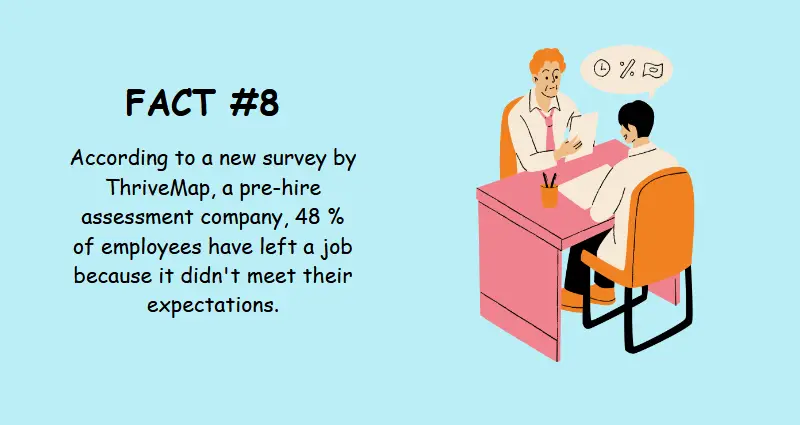
9. You were laid off
64% say being laid off proved beneficial to their career in the long run.
Being laid off can be a shock to the system. No matter what warning signs you see, the prospect of losing your job can still be unpleasant to hear.
If you have been dismissed, bear in mind that you are not responsible for this. The company or organization may have been struggling financially, or going through restructuring and reorganization for various reasons.
Once you have had some time to process the news, take steps to move forward. Update your resume before you start job search and start looking for other opportunities. Reach out to your network and ask if they know of any openings.
Tom was laid off due to company downsizing but quickly updated his resume and started applying for roles that better suited his skills.
Be honest when talking about why you left your last job. Don't be ashamed; instead, focus on the skills and experience you gained in the role and how you can use them in your next job.

10. You were fired
At times, you don't get to choose whether or not you want to quit the job. You may be terminated due to a number of reasons. Maybe you weren't meeting expectations or there was a miscommunication between you and your employer.
It can be challenging to process that it wasn't a mutual decision. But the world isn't over.
There are far better things ahead than we ever leave behind. | C.S. Lewis
Take some time for yourself and reflect on what happened. Learn from the experience and try to understand why it happened. It will help you adjust and adapt in the future, should something similar happen again.
After being fired for missing deadlines, Sarah reflected on what went wrong and took time to improve her time management before seeking new work.
On top of that, try to think positively about the situation. Take this chance to acquire fresh talents and knowledge by exploring other employment possibilities or returning to school. The opportunities are endless!
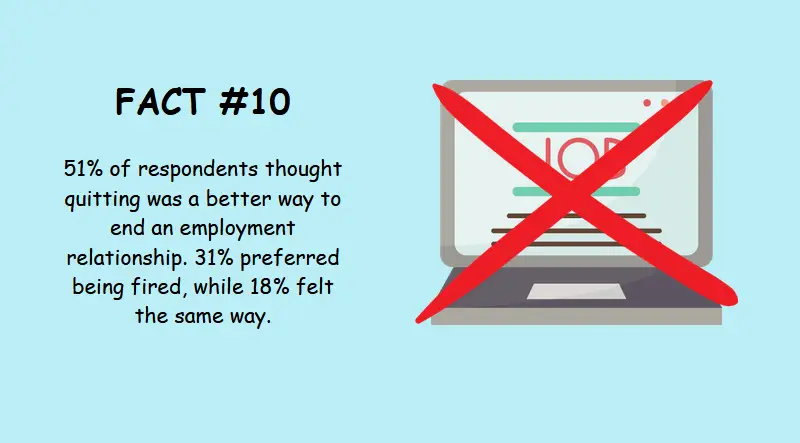
11. A personal reason for a job change
Operating in the workplace can be stressful, and it can become overwhelming occasionally. If there was a personal problem, like a mental illness or a loved one needing care, perhaps taking a leave was the best course of action.
Always keep in mind that your health and well-being come first. If the workload was becoming too much, then taking the time off could have been the optimal choice.
Michael took time off to care for an ill family member, prioritizing his health and family before returning to the workforce.
Sometimes it's necessary to take a step back in order to get back on track with your life. Leaving a job because of personal problems can be hard, and there may be some guilt involved. But if it helps you take care of yourself, then it is worth it in the end.
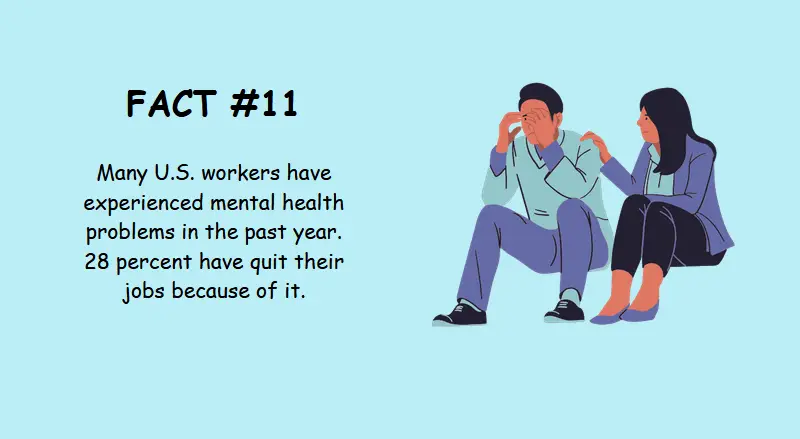
12. Organization restructuring
It's not uncommon for employers to reorganize their business operations as they grow and develop. This can often mean significant changes in job duties, scheduling, and other aspects of the workplace.
When an organization restructures, it can be a difficult process for employees. It's understandable to experience a sense of uncertainty about the future of the company and your role within it.
Following a company merger, Nina’s role was drastically changed, prompting her to pursue a position more aligned with her career goals.
If you're not pleased with the alterations your employer is making, you may ponder quitting your job. Before doing so, consider speaking with your supervisor or HR representative to ensure you realize how these changes will affect you and your work.
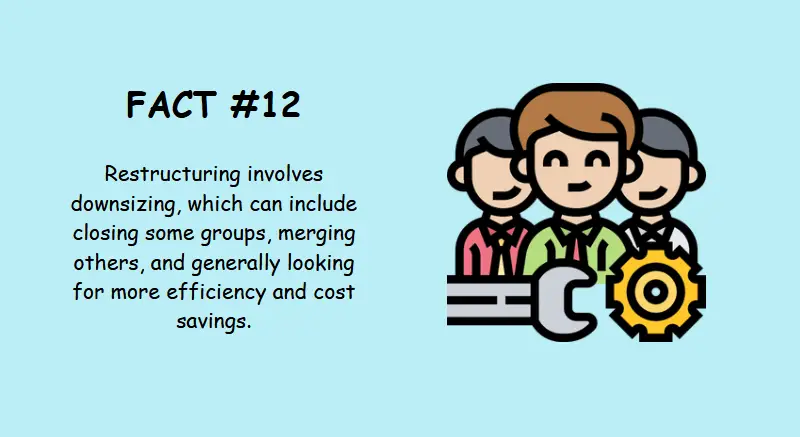
13. Feel unhappy at work
Work is an integral part of life. When you're unhappy at your job, it can have a negative effect on other areas of your life.
Common signs of unhappiness at work include low morale, lack of motivation, and a decrease in productivity. If you perceive that your career is damaging your emotional health, it is the right time when to quit a job.
After months of low morale and poor team relationships, Alex decided it was time to find a job that brought him more happiness.
It's important to identify the source of your unhappiness:
- Is it the type of work you're doing?
- Do you have a strained relationship with your director or colleagues?
- Are there too many hours or not enough pay?
Once you know what's causing your dissatisfaction, it'll be easier to decide if it's an appropriate time to progress.
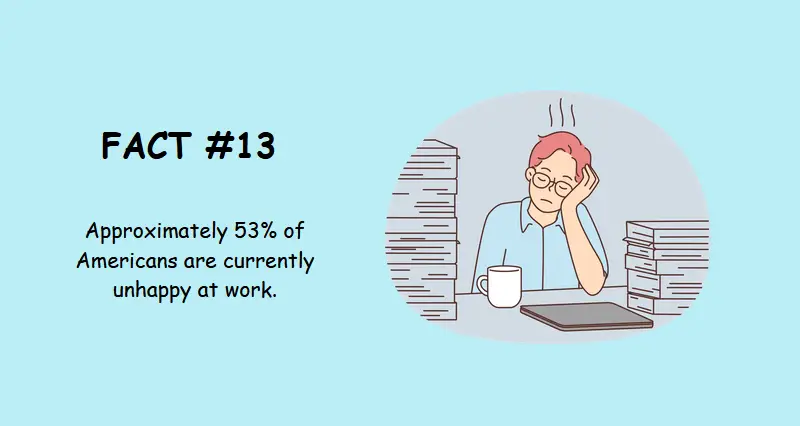
14. More promising offers by other firms
Everyone wants to get the best deal possible in their career. This includes finding a job that offers better pay or bonuses than the one you currently have. If you've received a proposal that's significantly better than your current job, it can be worth pursuing.
Evaluate salary, benefits, commute, work schedule, and overall environment. Do these factors outweigh the stability you have?
When Julia received an offer with better pay, benefits, and a shorter commute, she accepted it to advance her career and improve work-life balance.
Leaving a job for a better opportunity is a common practice and it shows that you're serious about advancing your career. Just be sure to weigh all of your options before making an informed decision.
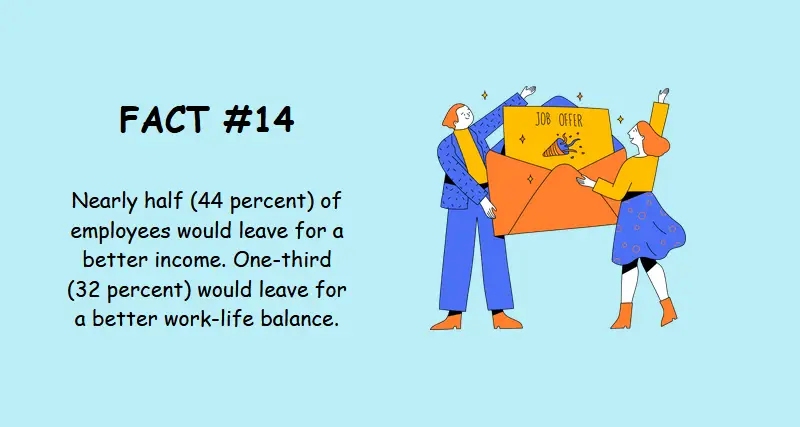
15. Burnout
Burnout occurs when individuals experience prolonged periods of stress or overwork without adequate rest or support. This can lead to exhaustion, cynicism, and a decreased sense of accomplishment in one's job.
Burnout often arises from unrealistic workloads, tight deadlines, or a lack of work-life balance.
When employees feel overwhelmed and unsupported, they may choose to leave their jobs in search of positions with greater work environment where they can better manage their stress levels.
Burnout can manifest in various ways, impacting both mental and physical health.
After months of nonstop deadlines and overtime, Kevin left his job to find a role that offered a healthier balance.
Here's how burnout may lead someone to leave a job:
- Exhaustion. Burnout often brings extreme fatigue. This can make it difficult for individuals to muster the energy to perform their job effectively. Constantly feeling drained can lead to a decline in productivity and quality of work.
- Decreased Motivation. Burnout can strip away the enthusiasm that once drove someone in their role. Tasks that were once fulfilling may now seem tedious and meaningless. This loss of motivation can contribute to a sense of disengagement and detachment from the job.
- Cynicism and Negativity. As burnout progresses, individuals may develop a negative or cynical outlook toward their work, colleagues, and organization. They may become increasingly irritable, impatient, and critical, which can strain relationships and further exacerbate feelings of isolation.
- Reduced Performance. Burnout often impairs cognitive function, memory, and decision-making abilities. This can result in decreased job performance, missed deadlines, and errors. The fear of making mistakes or being unable to meet expectations can intensify stress and perpetuate the cycle of burnout.
- Lack of Support. Feeling unsupported or undervalued by colleagues or management can exacerbate feelings of burnout. Without access to resources, recognition, or opportunities for growth, individuals may feel like they're trapped in a dead-end job with no prospects for improvement.
Ultimately, when the negative effects of burnout outweigh any perceived benefits of staying in a job, individuals may decide to leave in search of greater fulfillment, well-being, and professional satisfaction elsewhere.
List of bad reasons for leaving a job
Letting go of staff might be a difficult decision, but there are some false motives for doing so.
Here are five of the worst:
- You're bored. If you're feeling unfulfilled or unmotivated, it may be tempting to think quitting is the solution. However, leaving due to boredom is often a bad idea. Instead, take the time to look for solutions within the job.
- Wanting to avoid conflict. If you're changing your job because you don't want to deal with an uncomfortable situation or conflict, you might not be solving the problem. It's important to learn how to handle conflicts in the workplace, as they are inevitable in any job.
- Following friends or family. Quitting a job because a friend or family member has offered you a job elsewhere is not a good reason for wanting to leave a job. Make sure to consider the actual job and its potential for career growth before making such a decision.
- You need more money. While a higher salary may be a tempting reason for leaving your current job, it's not always the best decision. Think about other factors, such as job satisfaction and work-life balance, before making a decision based solely on money.
- You want to follow your passion. Following your passions can be incredibly rewarding, yet, leaving your job abruptly may not be the best way to do this. Try freelancing in your spare time while you are still employed, and make sure you have enough savings before you decide to quit.
Whatever the reason for leaving, remember that every decision has an impact, and examining each variant will help ensure that the right decision has been made.
What is job-hopping
It is a real phenomenon and a frequent reason for job change. It's when a person frequently changes jobs, often within the same field. In some cases, it can prove advantageous - like when you're trying to get higher pay or more responsibility. But in other cases, it can be a sign of underlying dissatisfaction.
What are the signs of job-hopping syndrome?
Here are the most common:
- You feel constantly bored with your current role.
- You are not feeling challenged or motivated to excel.
- You're looking for opportunities to gain more experience in your field.
- Not sure if you want to stay with the same company long term.
- You want more recognition or higher pay than what you're currently getting.
- You find no joy in your work.
If you're experiencing any of these points, take some time to think about why it is going that way. Are you simply stuck in a rut? Or could it be something else?
Regardless of your motives, it is always beneficial to take a moment to contemplate if now is the right time to proceed. Maybe switching jobs is the needed solution for you, but maybe it's not. Evaluate the pros and cons of each option before making your decision.
At the end of the day, no one can tell you what to do - only you know what's best for your ambitions and aspirations. Do your research and trust your gut - that's all that matters!
When to quit a job
Nearly 6 out of 10 employees (58%) said that they were afraid of being fired from their job.
Working out when to exit an occupation can be tricky. There are times when it's the right decision and other occasions when it might be best to stay.
Here are some indicators of when you might need to start looking for employment opportunities:
- Your goals and values no longer align with the company.
- Feel unappreciated as an employee.
- There will be no growth or new learning for you.
- Work-life balance is out of whack.
- Not being paid fairly for the work.
- There's no opportunity for advancement.
- The environment has become toxic.
- You've been passed up for promotions you deserved.
- You're not enjoying what you do.
- There's too much stress and you're feeling burned out.
If any of these are familiar to you, contemplate a career change. Take time to assess your situation and decide whether you really want to leave.
Steps to follow when the decision is made
So, what now?
There are some things to consider and actions to take before bidding farewell.
- Remain professional. Even if you had a bad experience, avoid any kind of negative behavior. Maintain relationships with coworkers and supervisors and leave on good terms.
- Update your resume. Refresh your application or create a resume and make sure that it reflects the experience, skills, and knowledge you gained while working at the company. This will help you find a better job.
- Plan your transition. Give two weeks of notice so that your employer can make arrangements for your replacement. If possible, try to tie up any loose ends before you leave and help out during the leave period.
- Stay in touch with former colleagues. Ask for references and recommendations and use online tools like LinkedIn to build a professional network of contacts that can help you.
What not to do when leaving a job
Once you've made up your mind to quit your job, there are certain things you should avoid doing in response.
- Never go behind your manager's back and talk to other colleagues or HR about leaving. This will only create problems for you and your team.
- Don't take any company property with you. This includes computers, phones, files, and other items belonging to the company. It's not worth putting yourself in trouble for something that isn't yours.
- Don't bad-mouth your former employer or workmates after you've left. Even if you felt wronged during your time there, stay professional and maintain good relationships with everyone involved.
- Don't be dishonest about the reason for leaving a job. Be open with your previous manager so they can help you transition out of the role properly.
- Don't forget to send a thank-you note or email to your teammates and managers. This will show that you appreciate all the support they've given you at the company. It will also ensure that everyone leaves on good terms.
Quitting a job can be hard, but following these steps can help make the process easier and smoother for both you and your employer. Best of luck!
Interview question
Why are you leaving your current job? That's one of the most tough questions to answer when it comes to getting interviewed.
75% of respondents are ashamed of being fired. 1 in 3 did not tell their family.
Some experts argue that the best way to handle this query is to be truthful and explain why you are seeking new employment. Others suggest focusing on the positive aspects of the new opportunity and avoiding any negative comments about your last occupation.
When deciding how to respond, consider the following: What should I put as a reason for leaving?
- If it was due to a conflict with a boss or co-worker, mentioning it could raise red flags for your potential employer. However, if you are leaving for career growth opportunities or higher pay, it could be advantageous to discuss these factors.
- Be honest but don't provide too much detail. Stick to the facts and make sure your explanation is concise. Remember that the interviewer is likely looking for reasons why you would be a good fit for the position.
- You can also use this as an opportunity to showcase your skills and highlight what you have learned from past experiences. Talk about how those lessons could benefit your future employer. This can help demonstrate that you see the importance of making informed decisions and taking responsibility for them.
No matter how you decide to respond, maintain a positive attitude throughout the process. Showing enthusiasm and optimism will help create a better impression of you as a candidate.
Sample answer:
I've enjoyed my time at my current company and have had the opportunity to work on some exciting projects, particularly in team management and client relations. However, I feel that I’ve grown as much as I can in my current role. I’m looking for an opportunity that offers more responsibility and the chance to work in a more innovative and dynamic environment. After researching your company, I believe the role here would provide the right platform for me to apply my skills in new ways.
Why employers want to know this
Recruiters often ask applicants during job interviews - "What were the reasons for quitting your previous job?". This important question helps HRs better understand what motivated a candidate to leave their previous job.
The question also:
- Provides insight into a job seeker's character and work ethic. If an individual leaves a prior job because of a lack of opportunities for advancement, it may indicate that they have a desire for personal growth. Conversely, if the reason is a toxic work environment, it detects a prioritization of healthy workplace dynamics.
- Aids employers in assessing if a contestant is compatible with their company culture. If an interviewee articulates that they left their earlier role because it was incompatible with their values or beliefs, it can be seen as a sign of loyalty and commitment to their next employer.
- Helps employers gauge how well an applicant communicates when discussing difficult topics. The answer should be professional and concise while addressing the main reasons.
Create your professional Resume in 10 minutes for FREE
Build My Resume
Conclusion
After examining the different explanations why individuals might opt to depart from their jobs, it's evident that no two cases are alike. People can have various motivations for leaving a job, and ultimately it's up to each individual to decide what is best for them.
It's important to keep in mind that quitting a job isn't necessarily a bad thing. At times, this can present an opportunity for self-development or a new challenge. Other times, it could be the best decision for your mental health.
Whatever the case may be, it's critical to examine all of your possibilities before coming to such an important decision.
Changing a job is never easy, but sometimes it can be necessary in order to move forward in life.
FAQ
- Is it better to leave before finding a new job?
- It depends on individual circumstances. Leaving a job before getting a new offer can be risky financially and professionally. However, in certain situations like toxic work environments or severe burnout, it might be necessary to prioritize mental health.
- How can employers reduce turnover due to these reasons?
- They can do it by offering competitive salaries and benefits, providing opportunities for career development, fostering an inclusive company culture, promoting work-life balance, and listening to employee feedback to address concerns promptly.
- How can one navigate quitting a job during uncertain economic times?
- It requires careful planning and consideration. The process may involve building a financial safety net, networking strategically, updating skills or certifications, and exploring industries or roles that are resilient to economic fluctuations.
- What are some alternatives to quitting a job entirely?
- Alternative options include requesting a transfer to a different department or location, negotiating flexible work arrangements, exploring part-time or freelance opportunities within the same organization, or taking a sabbatical to recharge and explore other interests.



